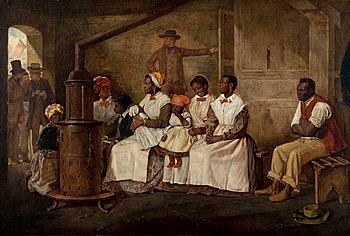Slavery and Homosexual arguments don't work with LGBT arguments
 |
| English: Slaves Waiting for Sale - Richmond, Virginia. Oil, 20¾ x 31½ inches. Painted upon the sketch of 1853 (Photo credit: Wikipedia) |
Matthew
Vines, another proponent of gay marriage and author of God
and the Gay Christian, writes, “In the 19th century, experience
played a key role in compelling Christians to rethink another traditional—and
supposedly biblical—belief. This time, the issue was slavery” (15).
Vines
claims that Christians have made pivotal decisions based on the principle of
good fruit and bad fruit. For example, the early church decided to include
Gentiles. Likewise, 19th-century Christian abolitionists “appealed to
conscience based on the destructive consequences of slavery. A bad tree
produces bad fruit” (15).
So,
for Vines, the church was basically supportive of slavery throughout
history until the 19th century, when “experience” brought about a
reinterpretation of Scripture. But is this a fair historical account?
Most importantly, does it do justice to the authority of Scripture?
Slavery’s Complex History
First,
we must acknowledge that the story of slavery throughout the ages is
complicated. Specifically, we must recognize key differences between
slavery in New Testament times and slavery in America and elsewhere in more
recent history. In his book Slave
of Christ: A New Testament Metaphor for Total Devotion to Christ (IVP
Academic, 2001), Murray Harris summarizes several key differences between
Greco-Roman slavery and New World slavery:
In the first century, slaves
were not distinguishable from free persons by race, by speech, or by clothing;
they were sometimes more highly educated than their owners and held responsible
professional positions; some persons sold themselves into slavery for economic
or social advantage; they could reasonably hope to be emancipated after 10 or
20 years of service or by their 30s at the latest; they were not
denied the right of public assembly and were not socially segregated (at least
in the cities); they could accumulate savings to buy their freedom; their
natural inferiority was not assumed. (44)
It’s
imperative that we understand these differences as we assess how the
church through the ages has interacted with slavery.
This is not to imply that
slavery in the first century was a pleasant thing. But the race-based,
chattel slavery practiced in the United States is in a different category.
There is no way to defend such an abomination from Scripture, and those who
sought to do so revealed their deep-seated racism.
While the
Bible lacks a crystal-clear text condeming the institution of
slavery, it does not commend slavery either. The features
of slavery in the first century (for example, not race-based, the regularity
with which slaves earned their freedom, and so on)—and also the critical
role this particular form of slavery played in the economy—help us to
understand why abolition was not on the apostles’ front burner.
Key Differences
The
abolitionist position rightly sees in Scripture indicators pointing toward
freedom. We can cite passages that seriously undermine the institution of
slavery (for example, Exod. 21:16; 1
Cor. 7:21; 1 Tim. 1:10; Philemon). Even
the passages some used to defend slavery were revolutionary in their original
context, for they put master and slave on the same footing (for
example, Eph. 6:9; Col. 4:1; 1
Tim. 6:1).
Additionally,
while slaves were instructed to obey their masters, the institution of slavery
was never rooted in creation. It was understood to be a reality of
contemporary life, not a creation ordinance from God.
In contrast,
one-man/one-woman marriage, gender roles, and the prohibition of homosexual
acts are consistently rooted in creation (Rom. 1:24–27,
where there are distinct echoes of the creation account; 1
Cor. 11:8–9; Eph. 5:31; 1
Tim. 2:13–14).
Scripture doesn’t
speak out explicitly against each and every sinful practice going on in the
world. Some practices such as slavery are tolerated within the
biblical narrative even while they far short of the God’s ideal. We
could put polygamy in this category, too. That we come across many
examples of polygamy in the Bible, even among individuals praiseworthy in
other respects, does not endorse the practice. Similarly,
the biblical passages addressing slavery shouldn’t be read as condoning slavery
as an institution. In fact, as we observed, the instructions
regarding slavery bring radical transformation to the master-slave
relationship.
We
may recognize one more key difference between the abolitionist arguments
and the pro-gay marriage arguments. The abolitionists were going against
the tide of culture, whereas gay-marriage proponents are jumping on board a
cultural movement that is picking up speed by the minute. As Tim
Keller observes:
During the Civil War, British
Presbyterian biblical scholars told their southern American colleagues who
supported slavery that they were reading the scriptural texts through cultural
blinders. They wanted to find evidence for their views in the Bible and voila—they found it.
If no Christian reading the Bible—across diverse cultures and times—ever
previously discovered support for same-sex relationships in the Bible until
today, it’s hard not to wonder if many now have new cultural spectacles on,
having a strong predisposition to find in these texts evidence for the views
they already hold.
Experience Is Not Ultimate
We
shouldn’t be surprised when Scripture challenges cultural trends, even
when it challenges our strongly felt experiences. At these
moments we must determine which authority holds final sway in our
lives. Every generation of believers will face new challenges to biblical
authority and new temptations to compromise the truth and manipulate
God’s Word to condone sinful practices. Today that temptation is
great, as it is proclaimed to us by respected professing
evangelicals.
But
experience is not the final arbiter of truth. Scripture is. In these times of
cultural upheaval, we must allow Scripture to interpret our
experiences—not vice versa.

